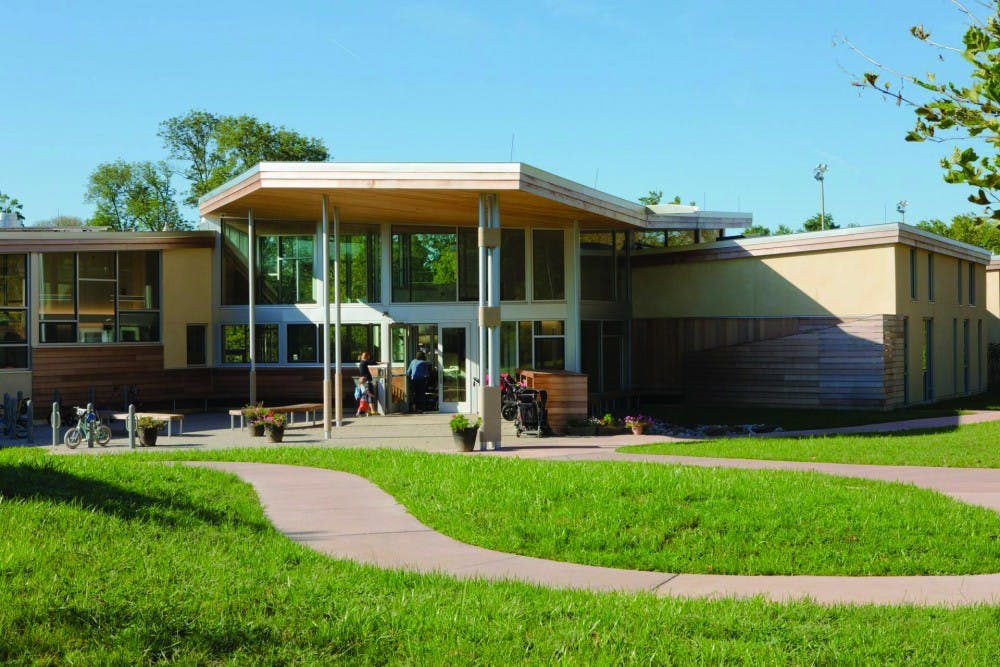The children of faculty are the beneficiaries of one the University’s most recent investments: high-quality childcare.
On Tuesday, Sept. 5, the new, non-profit University NOW Day Nursery building opened its doors to over 150 children, from infants to four-year-olds getting ready for kindergarten.
UNOW was originally started by the New Jersey Chapter of the National Organization of Women, but is now an independent organization that has kept the acronym.
While the UNOW Day Nursery has been operating for years now, the building, Princeton Childcare Center, was constructed for the UNOW Day Nursery and has allowed the nursery to expand enrollment.
Plans for the new UNOW Day Nursery began in 2013 when the University introduced the idea to UNOW in response to the faculty’s need for more childcare, especially for infants and toddlers. Built to accommodate children too young to easily use stairs, everything in the new facility is on the same floor. Long windows reaching down to the floor fill all rooms in the building with abundant natural light and allow little ones to look outside.
Demand for more child care for faculty, staff, and students predates this newest day nursery. Joan Girgus, a psychology professor emeritus, said that the new childcare center was “a long time coming.”
In fact, a new daycare — not associated with UNOW — was supposed to open several years ago, and the planning committee got as far as having finished architectural plans when the 2008 financial recession hit. However, according to Girgus, the University halted all projects not already under construction during the recession, including the new nursery.
Girgus said that this delay was “understandable” but “painful” because people needed more childcare, especially during the recession. Girgus also noted that having high-quality childcare so close to campus will enable parents to “feel more secure,” and may help the University recruit more female faculty members.

UNOW’s director, Susan Bertrand, agreed with Girgus about the importance of having childcare that is easily accessible to faculty and graduate students.
“Knowing your children are safe, loved, and well-cared for is a tremendous benefit for any parent,” she said. Bertrand explained that UNOW focuses on play-based learning, consistency, and — as listed in UNOW's mission statement — “nurturing all aspects of each child’s development.”
She contrasted this approach against for-profit “corporate care” institutions that prioritize academic “skill and drill” over encouraging children’s natural curiosity and learning how to navigate their relationships with other children and their teachers. Bertrand emphasized the key role nature plays in both UNOW’s philosophy and new facility, noting that the building is meant to be “light and bright,” with plenty of doors to the gardens and playgrounds. She said that it was critical that children use their senses to explore and observe the outside world.
“Whether it's a mud puddle, a drop of water, the chirp of a bird, a bug on a leaf, it’s their first experience with science,” Bertrand said.

According to Bertrand, one the most important parts of the new UNOW Day Nursery is its staff. UNOW maintains staff-to-child ratios that are below state requirements and also emphasizes staff longevity. Bertrand explained that staff are educated in early education and childhood development. They are also supported by benefits, as well as professional development to help them stay current with new developments in the field.
A lead teacher in the toddler room, Kelli Franceschini added that teachers make an effort to get to know children in other classes in order to ease their transition between age groups and teachers.
Franceschini said she was “so appreciative” of the new facility, adding that “children can feel safe and happy here.” At UNOW teachers are allowed to design and decorate their own classrooms, which are named after different elements of the garden. Franceschini heads the honey bee classroom, which includes bee-themed pillows for children to hug when they are feeling sad, as well as pictures of real bees intended to teach children not to fear them. Franceschini added that even the children have started bringing in bee-themed objects, including a flashlight.
As a lead teacher, Franceschini spends the whole day with her class, including three meals eaten “family-style” at a cluster of tables in her classroom. Franceschini added that she wanted the room to feel “homey,” and she designed individual cubbies for children’s personal belongings so that they could feel safe bringing stuffed animals from home.
Besides well-qualified teachers and personalized classrooms, students at UNOW enjoy enrichments like nature, movement, and music teachers. The center’s kitchen has a long, open window with little stools lined up beneath it so children can watch food preparation and participate in cooking projects.
There are also three separate playgrounds for infants, toddlers, and preschoolers, each planted with flowers and bushes and filled with age-appropriate toys.
Due to cost and location, UNOW will primarily serve University faculty and their families. Bertrand acknowledged that UNOW’s high tuition — which starts at $1,850 a month for full year care for a preschooler — creates a “financial threshold” many families are unable to reach. She said that the hallmarks of UNOW’s care, including excellent staff and amenities, are costly, and added that UNOW tries to give back to the community in other ways, like donating all the furniture from their previous location to a nursery for homeless children.
Girgus also noted that eligible University faculty, staff, and students receive portable grants to pay for child care, such as the Employee Child Care Assistance Program and the Student Child Care Assistance Program, respectively. However, she noted that most staff members live outside of Princeton and opt to use their grant closer to home.
Bertrand said she wished all families had access to high-quality, affordable child care and praised former President Barack Obama’s efforts to improve the federal Head Start program.
“Childcare is a political issue, it’s a feminist issue, it’s a families issue,” Bertrand said.








